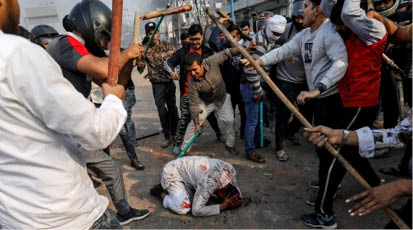The writer is of the view that the Indian constitution has multifarious provisions about fundamental freedoms and other rights.
But, the caste-based society and Hindutva-obsessed polity make the provisions meaningless.
The constitution provides for equality and rule of law. But, several draconian laws enable administration and armed forces to persecute minorities, or stifle dissent.
Irked at being poorly rated for its democratic practices, India under Narendra Modi announced to devise its own index for measurement of democracy.
India’s prestigious Frontline dated April 9, 2021 in its Cover Story titled “The terror of Laws” by Venkatesh Ramakrishnan and Divya Trivedi made the poignant observation that India’s democracy is backsliding leading to a rapid and alarming deterioration of political and civil liberties”.
The three institutions that came up with similar freedom-and-democracy indices are Sweden-based Varieties of Democracy (V-Dem), the US-based Freedom House (est since 1972) and the Economist Intelligence Unit.
V-Dem said, “India has become an electoral democracy”. Freedom House downgraded India from a “free democracy” to a partially-free democracy”.
All three studies held Modi’s government responsible for the backsliding of democracy owing to widespread attacks on human rights groups, intimidation of journalists and activists, rampant assaults on minority communities, especially Muslims.It is rare if a court gives relief to the incarcerated persons.
For instance, the chief judicial magistrate (Surat) acquitted 122 innocent persons after they had been in jail for 19 years. They were charged for having links with the Students’ Islamic Movement of India.
The bitter truth is that Indian democracy does have the “persona” but not the “spirit” of the real democracy.
The framers of the Indian constitution did realise that India was not a monolithic polity in terms of religion, races or languages.
Besides 80 percent Hindus, India has 11 percent Muslims and seven percent (combined) Buddhists, Jains, Christians, Parsis and Jews.
In view of the diversity, the Indian constitution recognises not only Hindi as the national language, but also 18 major languages originating in Dravidian South India or Indo-European noeth India. Furtherore there are 780 languages and dialects.
Such a diverse country could be held together only within framework of a “secular democratic and federal state”. As such, the Indian constitution promulgated on January 24, 1950 provides for a set of specific provisions, besides a set of fundamental rights to protect the interests of religious ethnic trials and the down-trodden (Dalit) communities.
The “fundamental rights” include “the right to equality”, the right to freedom”, “the right to freedom of religion”, “the right to freedom of religious, cultural, and educational rights”, “the right not to be exploited”, and the “right to constitutional remedies”.
Article 14 of the Indian constitution “guarantees the equality of all persons before the law”. Article 15 strictly prohibits “any discrimination between citizens on the grounds of religion, race, caste, sex, or place of birth.
Article 17 abolishes “the practice of untouchability”. Article 20 gives all minorities in India “the right to preserve and promote their language, script, and culture”.
Under Article 25, all persons are entitled to freedom of conscience and to freely practice and propagate their religion.
Article 35 provides reservations and quotas in college admissions and in government employment for the Scheduled Castes and Scheduled Tribes.
Neither the Hindu-dominant society nor the state allows preaching of one’s religion. A serial killer and member of Bharatya Janata Party Dara Singh set fire to the station wagon in which the Australian Christian missionary Graham Staines and his two children were sleeping, burning them alive at Orissa.
A low-caste Hindu can’t enter a high-caste temple.
The caste-based society caricatures the constitutional provisions of equality. The so-called Love-jehad and anti-conversion laws criminalise conversion from one religion to another.
A slew of draconian laws like the National Security Act, National Safety Act, Unlawful Activities Prevention Act, and Armed Forces Special Powers Act make the constitutional freedoms and protections meaningless. These laws oust the jurisdiction of civil courts or severely limit them.
India’s northern state of Uttar Pradesh is most flagrant in using the NSA to crack down on cow-related offences like transporting, or slaughtering cows or eating beef. Those charged under the NSA are deemed a threat to national security and can be detained without charge for up to a year.
Even prestigious Reuters (September 11, 2020) confirmed that `Indian state uses draconian law to detain those accused of killing cows’.
Uttar Pradesh Chief Minister Yogi Adityanath has repeatedly urged the use of the NSA to combat law and order issues in the state of more than 200 million people. The NSA, which Indian rights activists have described as draconian, is also frequently used in the contested region of Kashmir to detain people suspected of separatist activity.
Several intellect uals (poets, historians, lawyers) were arrested under the NSA. Their sole offence was to air dissent against government policies regarding the treatment of minorities. Gautam Naulakha was arrested for simply attending a Kashmir conference, organized by Dr. Ghulam Nabi Fai, in the USA.
Even phone intercepts are sufficient evidence to send a person behind the bars. SAR Geelani, a professor of Delhi University was sentenced to be hanged for a two-minute conversation with his family in the occupied Kashmir.
The police mistranslated the words `What has happened in New Delhi’ (‘Delhi kya korua’) ‘to ‘what have you done’ to unspoken ‘yeh kya korua’.
He was acquitted on appeal but soon died after his release. The professor was subjected to torture and he did not survive long after his acquittal.—KMS









